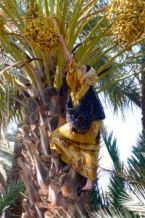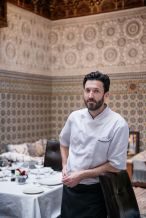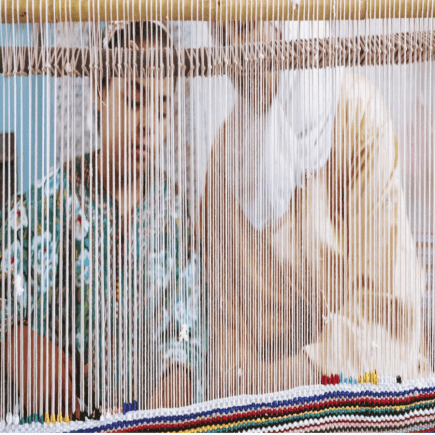
Morocco is well known for its beautiful and original wide array of hand-woven wool rugs. The design, colors, patterns, and materials used to craft the carpet differ from one Moroccan region to another.
In the Atlas Mountains, Boucherouite rugs are handwoven by Berber women. Instead of using traditional wool to weave the rugs, women in Morocco’s Atlas Mountain region weave together yarn rugs from recycled carpets, wool, cotton, nylon, and plastic from shipping bags and packaging material to create beautiful rugs. This art form has been passed on from one generation to another and is still alive and thriving today.
Boucherouite rugs are handwoven by Berber women. This art form has been passed on from one generation to another and is still alive and thriving today.
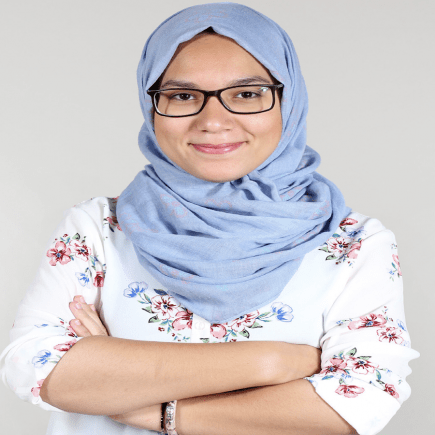
Fadwa Moussaif, a young eco-conscious Moroccan woman, saw in Boucherouite more than an art form on a rug. She saw it as a chance to promote sustainability in the fashion industry and support women in the Atlas Mountains.
Fadwa created IDYR (“Life” in Tamazight [Berber]), a social enterprise that rebrands and modernizes Boucherouite through making clothes, handbags and carpets while allowing women in the Atlas Mountains to make a profit from their talent. “As I grew up, I knew I wanted to help people in a sustainable way. So, I decided the best way to achieve this was to give people jobs.” claims Fadwa.
Born and raised in Casablanca, Fadwa developed an affinity for creative arts at a young age. Fadwa said, “In primary school, my friends and I loved drawing dresses and imaginary characters. I always drew the best dresses and accessories. My dream was to become a designer.”
Fadwa brainstormed her IDYR project idea while studying at Science and Technology School (FST) of Mohammedia, near Casablanca. Upon doing research for a school project, she and her partner Amal Kenzari, discovered that of the 12 villages they visited, at least 50% of the woman knew the art of Boucherouite rug making. More than 30,000 Moroccan women in rural areas have mastered this craftsmanship, yet only 15 % exploit the this knowledge as a source of income and financial independence.
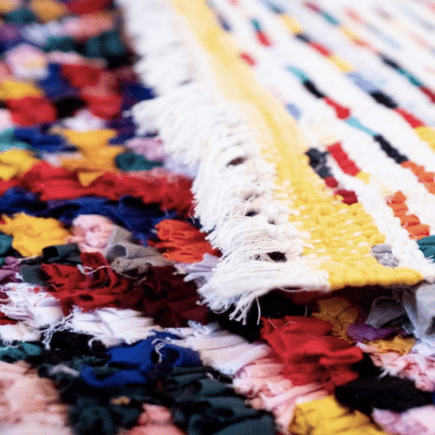
Once learning about this, Fadwa Moussaif came to the realization that Boucherouite Eco-Creation could be far more than just a school project and decided to turn it into a business. Fadwa and her partner, Amal started out looking for a source of good quality, raw materials. This led them to discover that Morocco’s textile business throws away 205,000 tons of cloth annually, and solely 8% from the undesirable supplies get recycled. They both became determined to recycle the undesirable material thrown away by Moroccan factories by way of the artwork of Boucherouite, concurrently defending the pure atmosphere and valorizing the abilities of Moroccan women in rural areas.
“I am realizing my childhood dream of supporting social and environmental causes. I always wanted to do something to sustainably help people in precarious situations, but I never knew how until I reached university,” Fadwa said. According to Fadwa, IDYR aims to have revived the art of Boucherouite, “a beautiful culture that overflows with values and history,” while fighting against unemployment.
“The art gives hope to artisans and young vulnerable girls,” she added. Fadwa could not wait to finish her studies to pursue her ambitious project and did not expect her business to be as successful as it is today. “I only began [the project] because I thought it would be nice. The idea of traveling alone, using public transportation, and meeting new people represented an adventure for me,” she recalled.
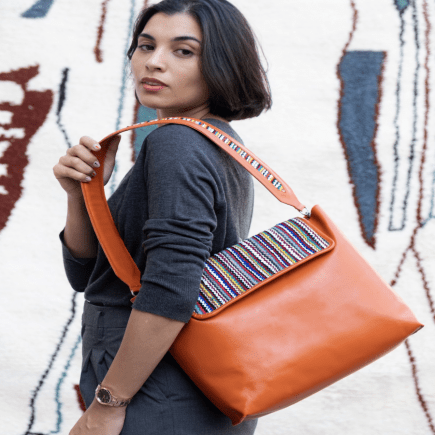
Fadwa’s original idea earned her several financing opportunities, notably from the Moroccan Center for Innovation and Social Entrepreneurship (MCISE). One of the phases that majorly shaped Fadwa as an entrepreneur and allowed her to take her business to the next level was her participation in the Anzisha Program thanks to her partner Amal who signed her in without informing Fadwa. The program is a partnership between the African Leadership Academy in South Africa and the Master Card Foundation. It seeks to increase the number of young entrepreneurs in Africa by identifying promising candidates and training them.
Fadwa flew to South Africa to take part in the training program. After her return to Morocco, the support from Anzisha did not stop. The program’s team continued to follow up with Fadwa’s project, providing the Moroccan entrepreneur with guidance. Today, IDYR’s impact is visible in the rural Berber villages where the company developed partnerships. The project has allowed many young girls who dropped out of school to shine as artisans and show their talents.
The company includes 15 members and their products are available in Morocco, France, Cyprus, and South Africa. Fadwa’s plan is to expand and promote the art of Boucherouite in more countries around the world. She also wants to encourage young Moroccans who are hesitant about venturing into entrepreneurship, advising them to be innovative and creative and to “awake their inner passions.”
Hard work and perseverance are also a must for reaching goals, Fadwa stressed. “If you cannot think of a concept, think about the coming generations who will live on this same earth, drink the same water, and breathe the same air. Let’s preserve them as much as we can,” Fadwa concluded.
For more information how to support Moroccan Berber women and purchase products from IDYR

